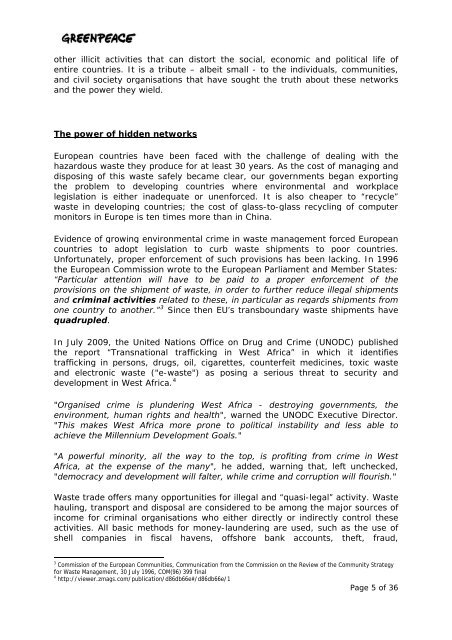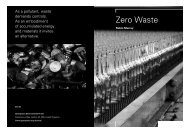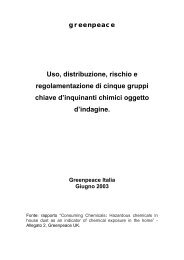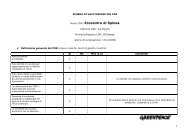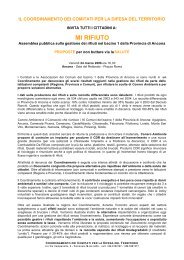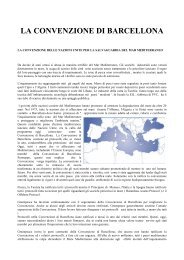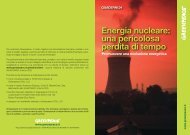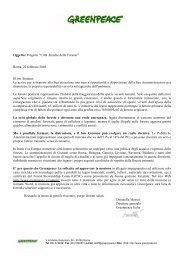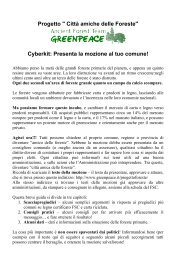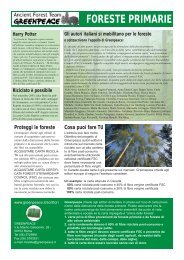The toxic ships
The toxic ships
The toxic ships
Create successful ePaper yourself
Turn your PDF publications into a flip-book with our unique Google optimized e-Paper software.
other illicit activities that can distort the social, economic and political life of<br />
entire countries. It is a tribute – albeit small - to the individuals, communities,<br />
and civil society organisations that have sought the truth about these networks<br />
and the power they wield.<br />
<strong>The</strong> power of hidden networks<br />
European countries have been faced with the challenge of dealing with the<br />
hazardous waste they produce for at least 30 years. As the cost of managing and<br />
disposing of this waste safely became clear, our governments began exporting<br />
the problem to developing countries where environmental and workplace<br />
legislation is either inadequate or unenforced. It is also cheaper to “recycle”<br />
waste in developing countries; the cost of glass-to-glass recycling of computer<br />
monitors in Europe is ten times more than in China.<br />
Evidence of growing environmental crime in waste management forced European<br />
countries to adopt legislation to curb waste shipments to poor countries.<br />
Unfortunately, proper enforcement of such provisions has been lacking. In 1996<br />
the European Commission wrote to the European Parliament and Member States:<br />
“Particular attention will have to be paid to a proper enforcement of the<br />
provisions on the shipment of waste, in order to further reduce illegal shipments<br />
and criminal activities related to these, in particular as regards shipments from<br />
one country to another.” 3 Since then EU’s transboundary waste shipments have<br />
quadrupled.<br />
In July 2009, the United Nations Office on Drug and Crime (UNODC) published<br />
the report “Transnational trafficking in West Africa” in which it identifies<br />
trafficking in persons, drugs, oil, cigarettes, counterfeit medicines, <strong>toxic</strong> waste<br />
and electronic waste ("e-waste") as posing a serious threat to security and<br />
development in West Africa. 4<br />
"Organised crime is plundering West Africa - destroying governments, the<br />
environment, human rights and health", warned the UNODC Executive Director.<br />
"This makes West Africa more prone to political instability and less able to<br />
achieve the Millennium Development Goals."<br />
"A powerful minority, all the way to the top, is profiting from crime in West<br />
Africa, at the expense of the many", he added, warning that, left unchecked,<br />
"democracy and development will falter, while crime and corruption will flourish."<br />
Waste trade offers many opportunities for illegal and “quasi-legal” activity. Waste<br />
hauling, transport and disposal are considered to be among the major sources of<br />
income for criminal organisations who either directly or indirectly control these<br />
activities. All basic methods for money-laundering are used, such as the use of<br />
shell companies in fiscal havens, offshore bank accounts, theft, fraud,<br />
3 Commission of the European Communities, Communication from the Commission on the Review of the Community Strategy<br />
for Waste Management, 30 July 1996, COM(96) 399 final<br />
4 http://viewer.zmags.com/publication/d86db66e#/d86db66e/1<br />
Page 5 of 36


